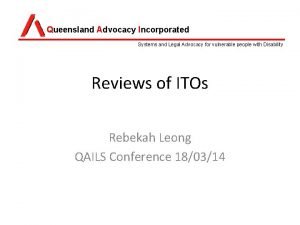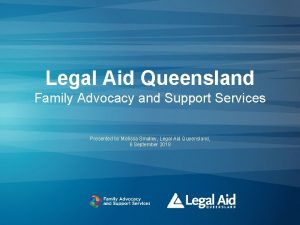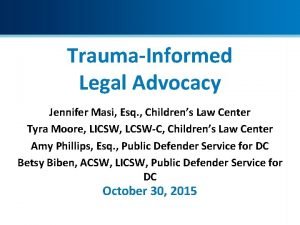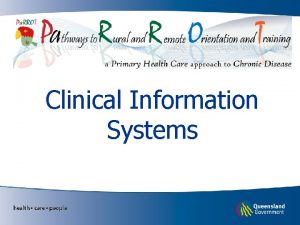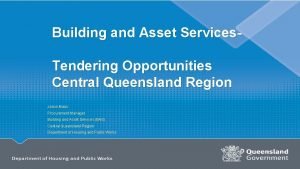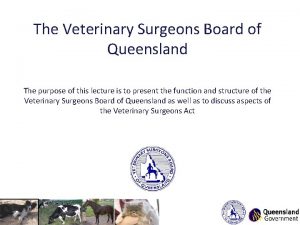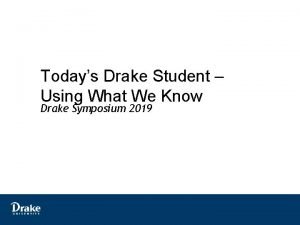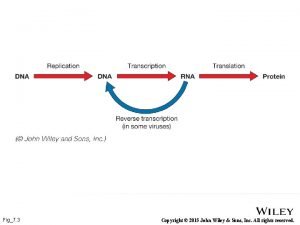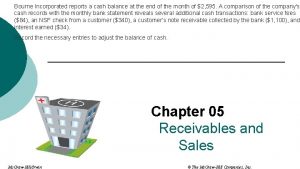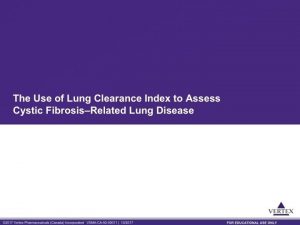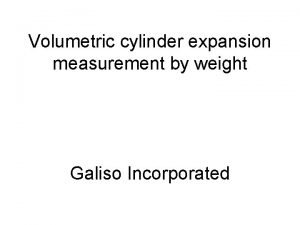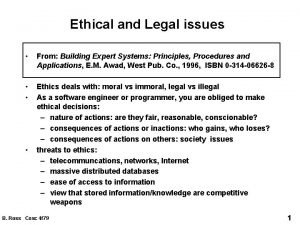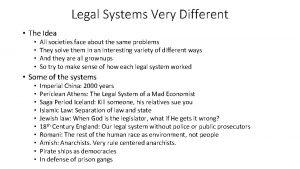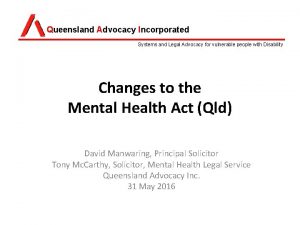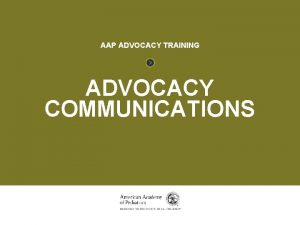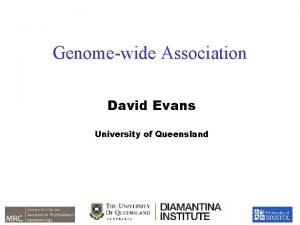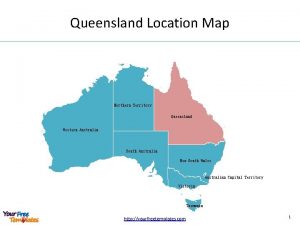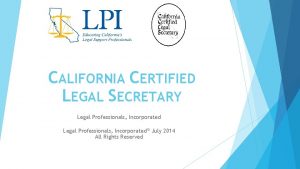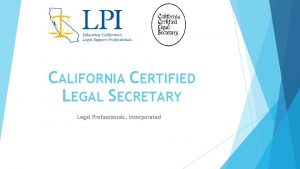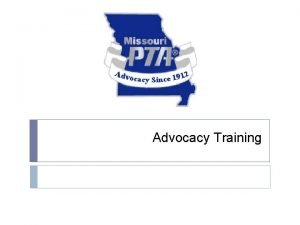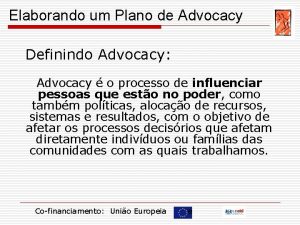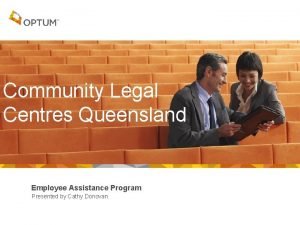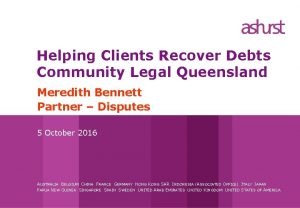Queensland Advocacy Incorporated Systems and Legal Advocacy for























- Slides: 23

Queensland Advocacy Incorporated Systems and Legal Advocacy for vulnerable people with Disability Reviews of ITOs Rebekah Leong QAILS Conference 18/03/14

Queensland Advocacy Incorporated Systems and Legal Advocacy for vulnerable people with Disability What is an ITO? • Categories of ITO – Inpatient – Community • Treatment: Anything done, or to be done, with the intention of having a therapeutic effect on the person’s illness.

Queensland Advocacy Incorporated Systems and Legal Advocacy for vulnerable people with Disability How do you stop an ITO? • Revoked by: – Treating psychiatrist (s 121) – Director of Mental Health (s 122) – MHRT on review (in first 6 weeks, then every 6 months or by application) – MHC on appeal (s 118) • After 6 months of no treatment (s 118)

Queensland Advocacy Incorporated Systems and Legal Advocacy for vulnerable people with Disability Treatment criteria (a) the person has a mental illness; (b) the person’s illness requires immediate treatment; (c) the proposed treatment is available at an authorised mental health service; (d) because of the person’s illness— (i) there is an imminent risk that the person may cause harm to himself or herself or someone else; or (ii) the person is likely to suffer serious mental or physical deterioration; (e) there is no less restrictive way of ensuring the person receives appropriate treatment for the illness; (f) the person— (i) lacks the capacity to consent to be treated for the illness; or (ii) has unreasonably refused proposed treatment for the illness.

Queensland Advocacy Incorporated Systems and Legal Advocacy for vulnerable people with Disability Proof • Civil standard of proof – balance of probabilities • Clinical report (7 days before hearing) • Oral evidence of patient • Oral evidence of treating team (consultant psychiatrist, registrar, case manager)

Queensland Advocacy Incorporated Systems and Legal Advocacy for vulnerable people with Disability (a) The person has a mental illness • “I don’t have a mental illness” • Relevant issues: – Diagnosis? – Symptoms? – Second opinion?

Queensland Advocacy Incorporated Systems and Legal Advocacy for vulnerable people with Disability (b) The person’s illness requires immediate treatment • Where client not receiving any medication • Where evidence that treatment is not working or the side effects of the medication outweigh the benefits of treatment.

Queensland Advocacy Incorporated Systems and Legal Advocacy for vulnerable people with Disability (c) The proposed treatment is available at an authorised mental health service

Queensland Advocacy Incorporated Systems and Legal Advocacy for vulnerable people with Disability (d) Risk of harm or deterioration Because of the person’s illness – (i) There is an imminent risk that the person may cause harm to himself or herself or someone else; OR (ii) The person is likely to suffer serious mental or physical deterioration.

Queensland Advocacy Incorporated Systems and Legal Advocacy for vulnerable people with Disability Identify risk and evidence of risk • Circumstances leading to the ITO • Changes in circumstances • Social circumstances, accommodation, support network • Historical indicators of risk • Risk of absconding • What does the patient stand to lose?

Queensland Advocacy Incorporated Systems and Legal Advocacy for vulnerable people with Disability Serious deterioration • • • Immediate or gradual? Drugs and alcohol Poor physical health Would the patient seek out help? Support network

Queensland Advocacy Incorporated Systems and Legal Advocacy for vulnerable people with Disability • • • (e) There is no less restrictive way of ensuring the person receives appropriate treatment for the illness Willlingness to engage in treatment Insight Side effects/benefits of treatment Therapeutic alliance Clear plans on future management of mental health Strong support network

Queensland Advocacy Incorporated Systems and Legal Advocacy for vulnerable people with Disability (f) Capacity The person – (i) lacks the capacity to consent to be treated for the illness; or (ii) has unreasonably refused proposed treatment for the illness.

Queensland Advocacy Incorporated Systems and Legal Advocacy for vulnerable people with Disability Capacity cont… • Definition: (a) understanding the nature and effect of decisions about the person’s assessment, treatment, care; and (b) freely and voluntarily making decisions about the person’s assessment, treatment, care; and (c) communicating the decisions in some way. • Presumption of capacity - s 8(b)

Queensland Advocacy Incorporated Systems and Legal Advocacy for vulnerable people with Disability MHRT powers • Confirm or revoke the ITO • S 191 If ITO confirmed, MHRT can: – Order change in category of ITO – Order limited community treatment – Order revoking limited community treatment – Order transfer – Order to amend or revoke a monitoring condition

Queensland Advocacy Incorporated Systems and Legal Advocacy for vulnerable people with Disability Second opinions • S 190 – After 6 months, MHRT must consider whether second opinion is appropriate. • S 457 – general power to order second opinions

Queensland Advocacy Incorporated Systems and Legal Advocacy for vulnerable people with Disability Relevant considerations • S 191(4) MHRT must have regard to: (a) the patient’s mental state and psychiatric history; (b) the patient’s social circumstances; (c) the patient’s response to treatment and willingness to continue treatment.

Queensland Advocacy Incorporated Systems and Legal Advocacy for vulnerable people with Disability Case Study Antonia is 45 years old and has been diagnosed with paranoid schizophrenia. She was admitted to hospital following a four year history of preoccupation with harassment, persecution, threats and surveillance by neighbours and police. Her concerns have led her to move home on 2 occasions. Antonia says she uncovered police corruption, but was unable to gather the witnesses to prove her claims. She does not accept she has a mental illness.

Queensland Advocacy Incorporated Systems and Legal Advocacy for vulnerable people with Disability Case study continued… After a period of being subjected to injections of antipsychotic medication, since November last year Antonia has been on oral medication. She says she is far happier on oral medication than the injection and would continue to take it. Antonia doesn’t accept she has a mental illness, nor personally accept the medication. But she understands that if she weren’t compliant with medication, this might lead to her having to go back to hospital. She is determined not to let this happen again. Her doctor says that she has no insight into her illness.

Queensland Advocacy Incorporated Systems and Legal Advocacy for vulnerable people with Disability Case study continued… Antonia’s husband says he has in the past monitored Antonia’s compliance with medication and would continue to do so. He would contact the hospital should she show signs of becoming unwell in the future.

Queensland Advocacy Incorporated Systems and Legal Advocacy for vulnerable people with Disability Section 8 – General principles • Presumption of capacity s 8(b) • Achievement of maximum potential and selfreliance s 8(d) • Maintenance of supportive relationships and community participation s 8(f) • Provision of treatment only if it is appropriate to promote and maintain the person’s mental health and well being s 8(h)

Queensland Advocacy Incorporated Systems and Legal Advocacy for vulnerable people with Disability Section 9 – Least restrictive practice A power or function under this Act relating to a person who has a mental illness or intellectual disability must be exercised or performed so that— (a) the person’s liberty and rights are adversely affected only if there is no less restrictive way to protect the person’s health and safety or to protect others; and (b) any adverse effect on the person’s liberty and rights is the minimum necessary in the circumstances.

Queensland Advocacy Incorporated Systems and Legal Advocacy for vulnerable people with Disability Organisations that do MHRT work • • QAI – 3844 4200; rebekah. leong@qai. org. au LAQ – advice and MHC matters Legal – QAI, QPILCH, QADA, TASC Advocacy organisations – Amparo, Independent Advocacy Townsville, Gold Coast Advocacy, Rights in Action (Cairns), Sunshine Coast Citizen Advocacy, Speaking Up for You, Mackay Advocacy, Queensland Parents for People with Disability, Capricorn Citizen Advocacy
 Qld advocacy incorporated
Qld advocacy incorporated Legal assistance services townsville
Legal assistance services townsville Trauma informed legal advocacy
Trauma informed legal advocacy Hbcis
Hbcis Building tendering services
Building tendering services Veterinary surgeons board qld
Veterinary surgeons board qld Queensland university of technology
Queensland university of technology Queensland mines ltd v hudson
Queensland mines ltd v hudson Uq som
Uq som Drake student accounts
Drake student accounts Uq eap
Uq eap Slq lynda
Slq lynda Ddcm incorporated
Ddcm incorporated John wiley & sons
John wiley & sons Bourne incorporated reports a cash balance
Bourne incorporated reports a cash balance Unincorporated vs incorporated business
Unincorporated vs incorporated business Vertex pharmaceuticals canada
Vertex pharmaceuticals canada Which function is incorporated into some intel cpus
Which function is incorporated into some intel cpus Ingasco
Ingasco Galiso incorporated
Galiso incorporated Infinity electric energy srl
Infinity electric energy srl Cfx roadmap
Cfx roadmap Legal expert systems
Legal expert systems Legal systems very different from ours
Legal systems very different from ours
